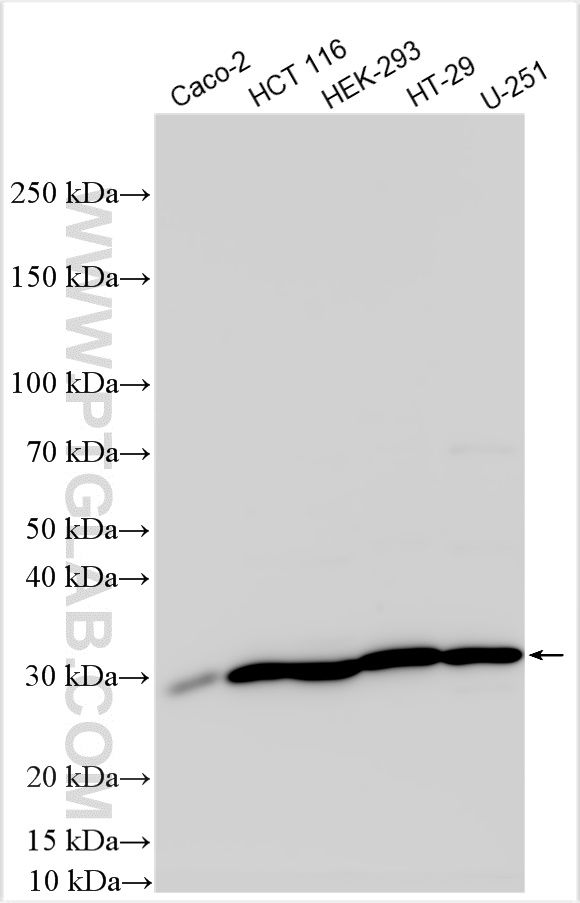HSD17B12 Polyclonal antibody
HSD17B12 Polyclonal Antibody for WB, ELISA
Host / Isotype
Rabbit / IgG
Reactivity
human
Applications
WB, ELISA
Conjugate
Unconjugated
Cat no : 27461-1-AP
Synonyms
Validation Data Gallery
Tested Applications
| Positive WB detected in | Caco-2 cells, HCT 116 cells, HEK-293 cells, HT-29 cells, U-251 cells |
Recommended dilution
| Application | Dilution |
|---|---|
| Western Blot (WB) | WB : 1:1000-1:4000 |
| It is recommended that this reagent should be titrated in each testing system to obtain optimal results. | |
| Sample-dependent, Check data in validation data gallery. | |
Product Information
27461-1-AP targets HSD17B12 in WB, ELISA applications and shows reactivity with human samples.
| Tested Reactivity | human |
| Host / Isotype | Rabbit / IgG |
| Class | Polyclonal |
| Type | Antibody |
| Immunogen | HSD17B12 fusion protein Ag26540 |
| Full Name | hydroxysteroid (17-beta) dehydrogenase 12 |
| Calculated Molecular Weight | 312 aa, 34 kDa |
| Observed Molecular Weight | 30 kDa |
| GenBank Accession Number | BC012043 |
| Gene Symbol | HSD17B12 |
| Gene ID (NCBI) | 51144 |
| Conjugate | Unconjugated |
| Form | Liquid |
| Purification Method | Antigen affinity purification |
| Storage Buffer | PBS with 0.02% sodium azide and 50% glycerol pH 7.3. |
| Storage Conditions | Store at -20°C. Stable for one year after shipment. Aliquoting is unnecessary for -20oC storage. 20ul sizes contain 0.1% BSA. |
Background Information
Hydroxysteroid 17-beta dehydrogenase 12 (HSD17B12, also known as KAR and SDR12C1) is a key enzyme of steroid metabolism pathway19 and is the human homolog of the yeast 3-ketoacyl-CoA reductase that catalyzes the second reaction in each VLCFA elongation cycle (PMID: 16166196; 12482854). It also acts as a drug-metabolizing enzyme (PMID: 36724833). HSD17B12 deficiency in embryonic stem cells reduced the production of arachidonic acid, a precursor of prostaglandins (PMID: 20130115).
Protocols
| Product Specific Protocols | |
|---|---|
| WB protocol for HSD17B12 antibody 27461-1-AP | Download protocol |
| Standard Protocols | |
|---|---|
| Click here to view our Standard Protocols |


